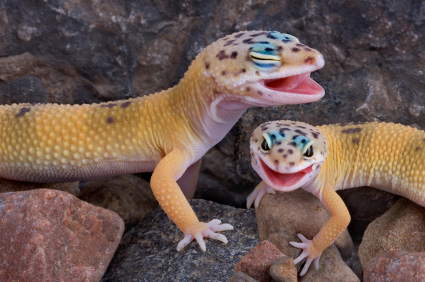My leopard gecko can’t open his eye.
Q. I have a leopard gecko that eats crickets regularly. My leopard gecko lives in a good-sized empty fish tank and drinks out of a water dish. The problem is that my leopard gecko cannot open his right eye. What can I do to fix this?

A. Eye problems in leopard geckos can be serious. So, my first suggestion is to make an appointment with a qualified herp veterinarian to have your leopard gecko’s eye examined.
In the meantime, if you feel up to it, you can try to gently flush some sterile saline (used for contact lens wearers) into the leopard gecko’s affected eye. You can purchase sterile saline (get one that is preservative-free) at any pharmacy, and gently squirt saline into and around your leopard gecko’s eye. Do not force it under your leopard gecko’s eyelids and do not apply any pressure. Also, do not allow the tip of the saline bottle to touch your leopard gecko’s eye or lids.
In some cases, leopard gecko eye problems can be caused by parasites. I have seen thin, string-type worms in the conjunctival sac of the eyes in pet leopard geckos. Occasionally, leopard gecko eye problems occur as the result of a foreign body, such as a piece of grit or plant material that lodges around the eye itself or under the eyelid. Other leopard gecko eye problems are the result of nutritional deficiency, such as hypovitaminosis A (not enough vitamin A in the diet). In some cases, leopard gecko eye problems occur as a result of trauma to the eye, from a scratch, bite or abrasion. Infection can occur on the leopard gecko eye or under the eyelids, as well, and, in some cases, a leopard gecko eye problem is indicative of a respiratory infection or other systemic infection.
As you can see, there can be many causes of leopard gecko eye problems, so if a simple eye flush with saline doesn’t take care of the problem, I would strongly recommend you seek the assistance of a herp veterinarian who can diagnose and treat the problem.
If you don’t have a herp veterinarian, you can call a couple of local dog and cat veterinarians and ask them who they refer reptile cases to. If there aren’t any qualified herp veterinarians in the area, you can always suggest to a veterinarian who may be willing to see your leopard gecko – but is perhaps lacking in experience – that he or she take advantage of the free consultation service offered by the larger veterinary diagnostic labs. Your veterinarian can call the lab they send laboratory samples to and request a free consultation with an experienced herp veterinarian who can guide and advise. This is a great way for recent graduates and inexperienced herp veterinarians who would like to learn more about herp medicine to speak with a herp veterinarian with a lot of clinical experience. No veterinarian should ever feel ashamed about calling for a consultation, as it is a wonderful opportunity for a herp veterinarian to learn and to benefit the patient, as well.
Regarding your leopard gecko’s diet, it is always much better to offer a variety of insects and to occasionally offer a small pinky mouse – if the leopard gecko is large enough to safely consume one. Crickets should optimally be gut-loaded, which means that prior to offering them to your leopard gecko, you should place the crickets in a container with powdered nutrients that the crickets feed on so they have a gastrointestinal tract full of extra nutrients that will benefit your leopard gecko. As an alternate way to enhance your leopard gecko’s diet, you can also dust the crickets and other insects with a commercially-prepared insect dusting product.
I hope this helps you with your leopard gecko and his eye problem. Leopard Gecko Care Sheet>>
Need a Herp Vet?
If you are looking for a herp-knowledgeable veterinarian in your area, a good place to start is by checking the list of members on the Association of Reptilian and Amphibian Veterinarian (ARAV) website at www.arav.org. Look for DVMs who appear to maintain actual veterinary offices that you could contact.



